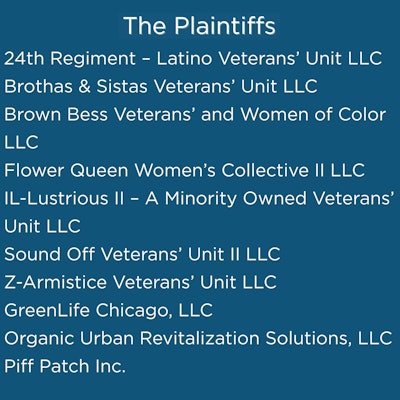
A group of social equity license applicants in Illinois have filed a lawsuit in Cook County Circuit Court against the Illinois Department of Financial and Professional Regulation (IDFPR) and Bret Bender, the deputy director of its Cannabis Control Section, for disqualifying their applications and not providing them the opportunity to participate in a process through which certain applicants can amend their applications and challenge their scores.
The plaintiffs are “Black, Latino, and veteran business owners,” according to a press release from the Coalition for Social Equity Justice in Cannabis. According to the complaint, various plaintiffs have served in the U.S. Army, Marines and National Guard and lived in Illinois’ “Disproportionately Impacted Areas.”

“We deserve to know why they failed to score our applications,” said Eva Hernandez, a veteran and social equity applicant, in a prepared statement from the release. “We put in the work, paid the fees, and responded to their requests for information. We deserve the same consideration and the same opportunity as everyone else.”
The complaint in the lawsuit was filed Oct. 5, the same day another lawsuit was filed in the Illinois Supreme Court. (That one was brought forth by finalists in Illinois’ license lottery who claimed Gov. J.B. Pritzker could not offer previously disqualified applicants a second chance.)
On Oct. 6, the plaintiffs in the circuit court lawsuit also petitioned for a “temporary restraining order, motion for preliminary injunction and motion for expedited discovery,” according to court records. They requested that the court subpoena KPMG, the Big Four accounting firm that scored the applications, to answer questions and provide insight into the scoring process. The plaintiffs asked about, among other things, the “basis of disqualification” for each of them, a description of “the process for issuing deficiency notices” (which they asserted in the complaint were “flawed and inconsistent”) and an identification of each person who knows how KPMG’s portal for applications works.
“IDFPR has acknowledged that there were problems with the review and scoring process,” Claudette Miller, an attorney for the plaintiffs, said in the press release. “These plaintiffs did respond on time to deficiency notices, so that cannot be the reason they were disqualified. The Department is committed to remedying scoring mistakes, but applicants who never even got a chance to be scored are being left behind. All we are asking for is an equal opportunity for everyone who followed the rules.”


























